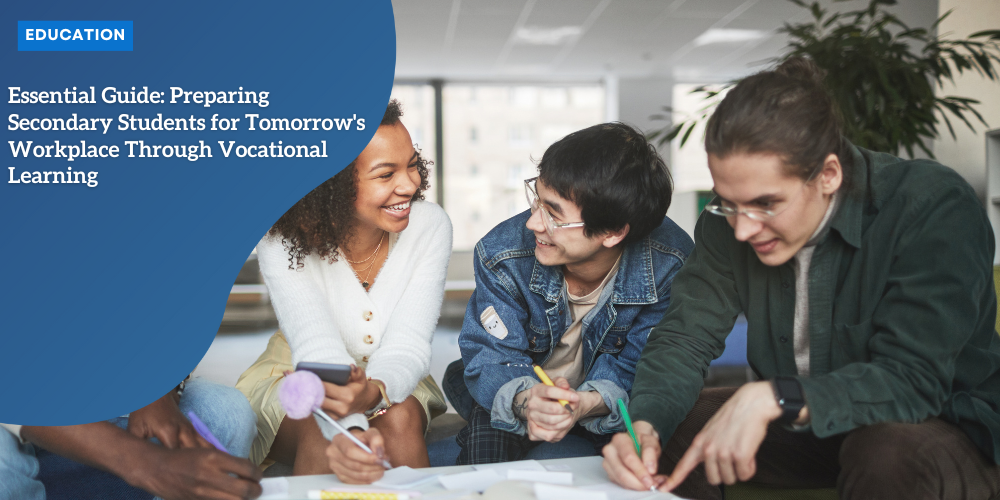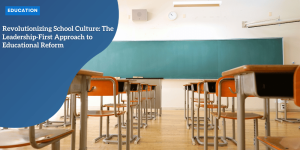Essential Guide: Preparing Secondary Students for Tomorrow’s Workplace Through Vocational Learning

Anúncios
The Evolving Landscape of Work: Why Vocational Education Matters
The Need for Diverse Skill Sets
The workforce of tomorrow must be multifaceted, possessing both technical know-how and soft skills to thrive and adapt.
In technology-rich environments, employees are expected to manage sophisticated tools and applications, understand data-driven decision-making, and engage in continuous learning.
Vocational education addresses these needs by providing hands-on experience and practical skills that are directly applicable in a professional setting.
Moreover, the importance of skills such as problem-solving, teamwork, and emotional intelligence cannot be underestimated.
Anúncios
These competencies enable individuals to work harmoniously in diverse teams, communicate effectively, and manage workplace challenges with emotional resilience.
Through vocational education and training (VET) programs, students can develop these essential social and emotional skills alongside their technical capabilities.
Beyond Traditional Education
Traditional educational pathways often emphasize academic knowledge, which, while necessary, isn’t sufficient on its own to prepare students for the varied demands of modern workplaces.
Vocational learning complements this by offering a more holistic and pragmatic approach.
It equips students with the experience and confidence to enter the workforce, making informed career choices and adapting to new roles as needed.
Anúncios
 Students
Students
Vocational education fosters career exploration, helping students identify their strengths and interests early on.
This proactive approach to career development ensures that when students graduate, they are not only knowledgeable but also skilled and ready to embark on their professional journeys.
As we continue to discuss essential skills for future success, it’s evident that integrating vocational learning in secondary education is crucial.
This strategic blend of academic and vocational training will arm students with a competitive edge and the ability to navigate ever-changing job landscapes.
Understanding Vocational Learning in Secondary Education
Defining Vocational Learning and Its Role in Career Exploration
Vocational learning is an educational approach designed to equip secondary students with the practical skills and knowledge necessary for specific trades or professions.
It serves as an essential tool for career exploration, helping students understand the various career possibilities available to them and the pathways to achieve their goals.
By engaging in vocational education, students can gain firsthand experience in different fields, which can be invaluable in making informed decisions about their future careers.
Identifying Career Pathways
One of the significant benefits of vocational education is its capacity to help students identify and solidify their career pathways.
Through exposure to various industries and hands-on training, students can better understand their interests, strengths, and potential career opportunities.
Vocational education also offers structured guidance on the necessary steps to pursue specific professions, including the required education, certifications, and skills, thereby creating a clear roadmap for students to follow.
Integration of VET Programs in Secondary Schooling
The integration of Vocational Education and Training (VET) programs into secondary education plays a critical role in preparing students for the workforce.
VET programs are designed to complement traditional academic curricula by providing practical, skills-based training that aligns with industry needs.
This integration ensures that students are not only academically prepared but are also ready to meet the practical demands of the modern workplace.
School-based VET programs offer numerous benefits, such as:
- Access to industry-standard equipment and resources. 🛠️
- Opportunities for work placements or apprenticeships. 💼
- Collaboration with local businesses and industry leaders to provide real-world learning experiences. 🤝
- Comprehensive career education that includes both technical and soft skills training. 🎓
By embedding VET programs within secondary schooling, educational institutions can bridge the gap between academic learning and the practical requirements of today’s job market.
This approach ensures that all students have the opportunity to develop the skills and knowledge needed for a successful transition from school to further education, training, or employment.
Transitioning from traditional education alone, vocational learning in secondary schools emphasizes practical skills and real-world applications, giving students a comprehensive education that prepares them for the dynamic and competitive global job market.
This approach ultimately equips students with the tools they need to thrive in their chosen careers and adapt to the ever-evolving demands of the workplace.
Essential Skills for Future Success
Development of Technical and Enterprising Capabilities
Preparing students for future workplaces requires fostering both technical and enterprising skills.
The rapid advancement in technology means that students need to be adept at using and understanding new tools and platforms.
For instance, proficiency in coding, data analysis, and digital content creation are essential in many modern careers.
Practical learning through Vocational Education and Training (VET) helps cultivate these competencies by immersing students in real-world scenarios where they can apply their knowledge and skills.
Building Career Management and Decision-Making Skills
Beyond technical prowess, students must also acquire robust career management and decision-making skills.
These include understanding the job market, identifying potential career paths, and planning personal development.
Career education programs should therefore provide resources and guidance on how to navigate educational and professional choices effectively.
Tools such as career counseling sessions, mentorship programs, and industry workshops aid students in developing a clear understanding of their strengths, interests, and values, and how these align with various career opportunities.
They teach valuable skills such as resume writing, interview techniques, and how to approach networking—all of which are integral for a successful career transition.
Balancing Cognitive Abilities with Social and Emotional Competencies
For long-term success, it’s essential to balance cognitive abilities with social and emotional competencies.
Cognitive skills like critical thinking, reasoning, and complex problem-solving are undoubtedly important, but they are not sufficient on their own.
Employers increasingly value skills such as teamwork, communication, adaptability, and emotional intelligence.
By integrating group projects, peer evaluations, and reflective practices into the curriculum, schools can ensure students grow not just academically but also in their ability to interact with others, manage their emotions, and handle interpersonal conflicts.
Vocational programs emphasize these competencies by placing students in collaborative environments and pushing them to engage with various stakeholders, including peers, teachers, and industry professionals.
This exposure helps students develop a global mindset and the emotional resilience necessary to thrive in diverse and dynamic workplace settings.
As the workplace continues to evolve, equipping students with a comprehensive set of skills will ensure they are prepared to meet the demands of modern careers and lead fulfilling professional lives.
The Future Ready Strategy: A National Approach
Overview of the Future Ready National Career Education Initiative
The rapid evolution of the job market necessitates a forward-thinking approach to career education.
Enter the Future Ready national career education initiative.
This strategy aims to equip students with the diverse skill sets needed to thrive in the technology-rich, globally competitive environments of tomorrow’s workplaces.
Developed with input from a broad spectrum of stakeholders, the initiative prioritizes access to high-quality career education for every student.
The overarching vision behind Future Ready is to ensure that students are well-prepared to make informed decisions about their future educational, training, and employment options.
With the landscape of work constantly shifting, it’s vital that students can adapt and navigate new challenges effectively.
This framework seeks to empower students with the technical, enterprising, and career management capabilities imperative for the future.
Exploring the Collaboration Between Education, Business, and Industry Stakeholders
A standout feature of the Future Ready strategy is its strong emphasis on collaboration.
This collaborative approach is designed to reflect the real-world dynamics students will encounter post-school.
By bringing together education providers, businesses, industry leaders, parents, carers, career advisors, and youths, Future Ready ensures that students gain insights from all facets of the employment spectrum.
This broad input helps tailor career education to meet current and future job market requirements.
The aligned contributions of these diverse stakeholders result in programs that simulate real-world conditions, offering students practical experience and firsthand understanding of various career paths.
This collaborative model is key in preparing students not just academically, but also experientially, resulting in a smoother transition from school to the workforce.
Ensuring Universal Access to High-Quality Career Education
One of the core principles of the Future Ready strategy is its commitment to universal access. Ensuring all students—regardless of their background or circumstances—receive high-quality career education is crucial.
The strategy includes provisions to support equity, with particular attention to marginalized groups like Aboriginal and Torres Strait Islander students.
By focusing on inclusivity, the initiative works towards bridging gaps and leveling the playing field for all students.
High-quality career education under Future Ready encompasses the development of essential skills needed in modern workplaces.
These range from technical skills like coding and data analysis to social and emotional competencies that enhance team collaboration and adaptability.
It also includes providing resources and tools necessary for effective career management and decision-making.
As students develop these skills, they become better positioned to take on the demands of future jobs, thereby enhancing their employability and readiness to contribute to the economy meaningfully.
This holistic, inclusive approach ensures that every student receives the education and support they need to achieve their career aspirations, setting the stage for a future workforce that’s diverse, skilled, and ready to take on the challenges of an ever-changing job market.
Building Strong School-Employer Partnerships
Creating Meaningful Connections Between Schools and Workplace Environments
Creating strong partnerships between schools and employers is essential for preparing students for future workplaces.
These connections provide students with valuable insight into various career options and help them understand the real-world applications of their education.
By drawing on the resources and expertise of industry professionals, schools can offer more specialized and up-to-date training that aligns with current job market demands.
Schools should actively seek opportunities to collaborate with local businesses and industries to create a network of support for their vocational education and training (VET) programs.
These partnerships can involve guest lectures, career days, internships, and work-based learning experiences, all of which provide students with direct exposure to the expectations and requirements of different professions.
Facilitating Real-World Learning Experiences Through Industry Engagement
Engaging with industry partners is crucial for facilitating real-world learning experiences for students.
Such experiences allow students to apply the theoretical knowledge they have gained in the classroom to practical, hands-on tasks within a real work environment.
This not only enhances their technical skills but also helps them develop essential soft skills like communication, teamwork, and problem-solving.
One approach to fostering this engagement is by organizing internships and work placements for students.
These experiences enable students to gain firsthand insight into the workplace while also building a professional network that can be invaluable as they transition into their careers.
Additionally, having industry professionals visit schools for workshops and mentorship programs helps bridge the gap between education and employment.
Preparing Students for Contemporary Recruitment Processes
As workplace expectations evolve, so too must the way students are prepared for the recruitment process.
It’s essential for schools to equip students with the skills and knowledge they need to navigate modern hiring practices effectively.
This includes understanding how to create a compelling resume, developing strong interviewing skills, and leveraging digital platforms for job searches and professional networking.
Schools can prepare students for these processes by incorporating career education into their curriculums.
This might involve mock interviews, resume building workshops, and training on online job application platforms.
By simulating the recruitment process, students can gain confidence and experience, making them well-prepared for their job hunts after graduation.
Furthermore, having partnerships with employers allows schools to stay informed about the latest trends and expectations in hiring practices.
This ensures that the career education provided to students is relevant and up-to-date, ultimately leading to better job readiness.
Building strong school-employer partnerships is a cornerstone of effective vocational education.
By creating meaningful connections with the workplace, facilitating real-world learning experiences, and preparing students for contemporary recruitment processes, these partnerships ensure that students are well-equipped to meet the demands of the modern job market.
This collaborative approach supports a seamless transition from school to further education or employment, fostering long-term success and fulfillment for students.
| Scenario | Before | After (Improved Support) |
|---|---|---|
| 🌏 Aboriginal and Torres Strait Islander Students | Limited specialized support for students | Tailored programs offering career guidance, inclusion of Indigenous knowledge, and mentorship |
| 💰 Financial Assistance for VET | Limited access for low-income students | Financial support to ensure participation in VET programs for low-income students |
| 📚 Outreach & Awareness | Limited awareness of vocational pathways | Outreach initiatives to inform students and families about vocational opportunities |
| 📝 Personalized Career Guidance | General career advice | Personalized assessments, one-on-one counseling, and tailored career plans |
| 🎓 Vocational Learning Opportunities | Limited access to diverse learning options | Equitable access through flexible learning options |






